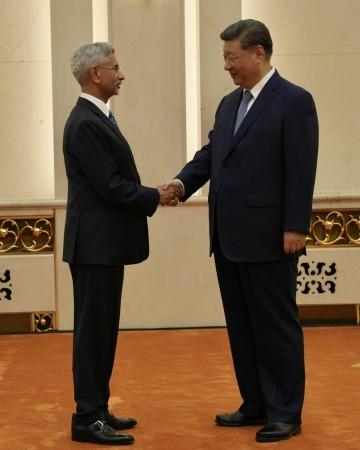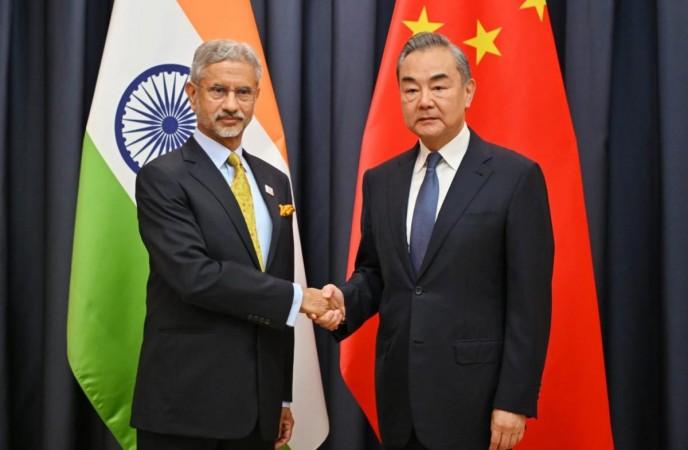
External Affairs Minister (EAM) S. Jaishankar's recent visit to Beijing marked a significant moment in India-China relations. On July 15, Jaishankar met with Chinese President Xi Jinping, a meeting that underscored the importance of dialogue between the two nations.
This engagement was part of the Shanghai Cooperation Organisation (SCO) Council of Foreign Ministers' call on the Chinese President. During the meeting, Jaishankar conveyed greetings from President Droupadi Murmu and Prime Minister Narendra Modi, highlighting India's commitment to maintaining constructive ties with China.
In a post on X, Jaishankar stated, "Called on President Xi Jinping this morning in Beijing along with my fellow SCO Foreign Ministers. Conveyed the greetings of President Droupadi Murmu & Prime Minister Narendra Modi. Apprised President Xi of the recent development of our bilateral ties. Value the guidance of our leaders in that regard."
This visit was Jaishankar's first to China since the Galwan Valley clash in May 2020, a confrontation that had strained bilateral relations. The EAM's presence in China was primarily to attend the SCO Council of Foreign Ministers' Meeting in Tianjin, a precursor to the 25th Heads of State Council meeting of the SCO scheduled for later this year.
India, having chaired the SCO in 2023, continues to play a vital role in this regional security bloc, which includes China, Russia, Kazakhstan, Kyrgyzstan, Tajikistan, Uzbekistan, Pakistan, Iran, and Belarus. The SCO's agenda spans counterterrorism, security, economic cooperation, and regional connectivity, making it a critical platform for India-China engagement.

During his visit, Jaishankar held multiple high-level meetings to deepen dialogue and cooperation with Chinese officials. He met with Liu Jianchao, Minister of the International Department of the Chinese Communist Party Central Committee, to discuss the need for a constructive India-China relationship.
Additionally, he held a bilateral meeting with Chinese Foreign Minister Wang Yi, a senior member of the CPC Political Bureau. In these discussions, Jaishankar emphasized a long-term approach to resolving bilateral issues, stating, "Incumbent on us to address aspects related to the border, normalising people-to-people exchanges and avoiding restrictive trade measures and roadblocks. Confident that on the foundation of mutual respect, mutual interest and mutual sensitivity, ties can develop along a positive trajectory."
The EAM also met with Chinese Vice President Han Zheng, reiterating that further normalization of India-China ties can yield mutually beneficial outcomes. He stressed the importance of open exchanges of views and perspectives between the two neighbors and major economies, especially in the current complex global environment. Highlighting the 75th anniversary of diplomatic relations between India and China, Jaishankar welcomed the resumption of the Kailash Mansarovar Yatra, which had been suspended since 2020 due to the pandemic and border tensions.
However, the visit was not without its controversies. Rahul Gandhi, Leader of Opposition in Lok Sabha and Congress MP, criticized Jaishankar's meeting with Xi Jinping, accusing him of "running a full-blown circus" aimed at "destroying" India's foreign policy. Gandhi's remarks came after Jaishankar apprised Xi of the recent developments in bilateral ties, a move that Gandhi perceived as undermining India's diplomatic stance.
In a post on X, Gandhi wrote, "I guess the Chinese foreign minister will come and apprise Modi about recent developments in China-India ties. The EAM is now running a full-blown circus aimed at destroying India's foreign policy."
Despite the criticism, Jaishankar remained focused on the positive trajectory of India-China relations. He expressed confidence that his discussions during the visit would maintain this trajectory, referring to the progress made since the Kazan meeting. Following the 2024 summit, India and China agreed to disengage troops stationed at Depsang and Demchok, two key flashpoints in Ladakh where military tensions had persisted since 2020. This disengagement was a significant step towards restoring peace and strategic trust between the two nations.
Jaishankar also addressed the issue of Chinese restrictions on the export of critical minerals, urging China to avoid "restrictive trade measures and roadblocks." He emphasized that differences should not become disputes and competition should not become conflict. This sentiment was echoed in his discussions with Wang Yi, where he stressed that peace on the border was essential for restoring strategic trust and furthering relations. "It is now incumbent on us to address other aspects related to the border, including de-escalation," he said.
The SCO meeting in Tianjin was a platform for India to assert its commitment to regional security and cooperation. Jaishankar's engagement with SCO Secretary-General Nurlan Yermekbayev highlighted the contribution and importance of the SCO, as well as efforts to modernize its working. India's participation in various SCO meetings has intensified in recent months, with visits from Defence Minister Rajnath Singh and National Security Advisor Ajit Doval to China in June for discussions on regional defense and security under the SCO framework.
Related








